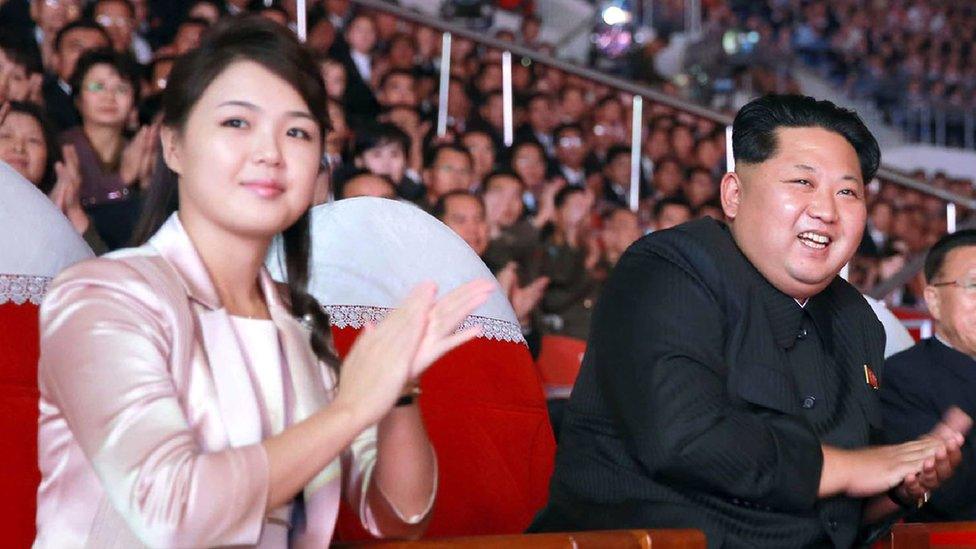Donald Trump cautious on N Korea nuclear disarmament talks
- Published
Kim Jong-un welcomes South Korean officials
Donald Trump has reacted cautiously to news that North Korea is willing to talk about giving up its nuclear weapons if it did not feel threatened.
The US president said "the statements coming out of South Korea and North Korea have been very positive", but also said it might be a "false hope".
South Korea earlier said the subject was raised when its officials met the North's leader, Kim Jong-un, on Monday.
Seoul said Mr Kim was also open to US talks, and would pause weapons testing.
However previous talks with North Korea have come to nothing.
There has also been no immediate comment from Pyongyang itself.
Further news that the leaders of North and South Korea have also agreed to meet at a summit next month, came via the leader of the South's delegation, Chung Eui-yong.
It would be the first such meeting for more than a decade and the first since Kim Jong-un took power in North Korea in 2011.
What did President Trump say?
"We have come certainly a long way, at least rhetorically, with North Korea," Mr Trump said.
"The statements coming out of South Korea and North Korea have been very positive. That would be a great thing for the world."
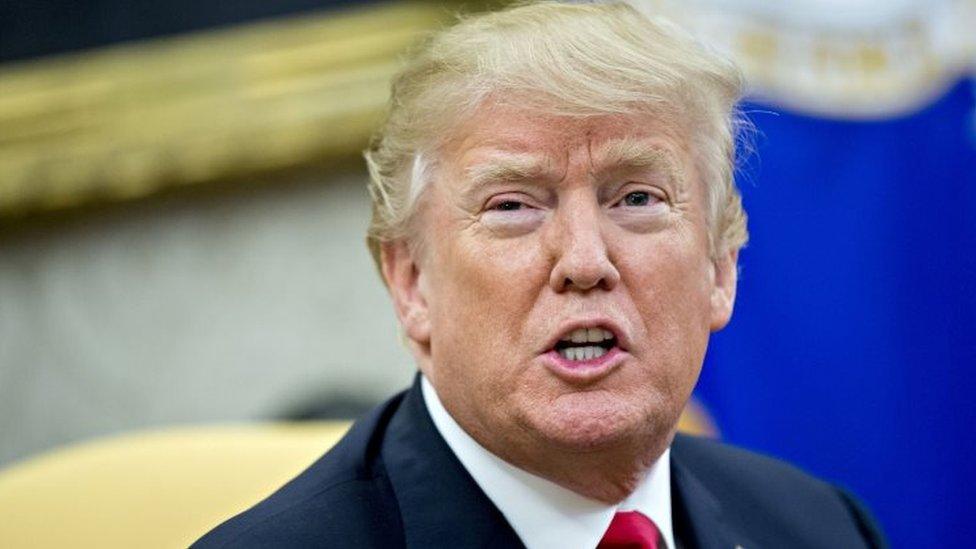
President Trump warned of a "false hope"
The US leader also praised Pyongyang for its decision to take part in the Pyeongchang Olympics in South Korea.
But he earlier posted a cautious tweet, warning about a "false hope".
Allow X content?
This article contains content provided by X. We ask for your permission before anything is loaded, as they may be using cookies and other technologies. You may want to read X’s cookie policy, external and privacy policy, external before accepting. To view this content choose ‘accept and continue’.
While the US president said he believed Pyongyang's offer to hold denuclearization talks was "sincere" he said it was "also because of the sanctions and what we're doing with respect to North Korea."
Meanwhile, US Vice-President Mike Pence said the US remained "committed to applying maximum pressure on the Kim regime to end their nuclear program".
All options were on the table, he said, and US posture towards the regime would not change "until we see credible, verifiable, and concrete steps toward denuclearisation".
The US has maintained that North Korean gestures of rapprochement would carry little weight without a commitment on nuclear weapons - particularly following last year's nuclear and missile tests carried out by the North.
The South Korean delegation is expected to visit Washington later this week to brief US officials on their talks in the North.
What is North Korea reported to have said?
A statement from the South Korea president's office issued earlier on Tuesday said: "The North showed willingness on denuclearisation in the Korean Peninsula. If military threats to the North Korea decrease and regime safety is guaranteed, the North showed that it has no reason to retain nukes."
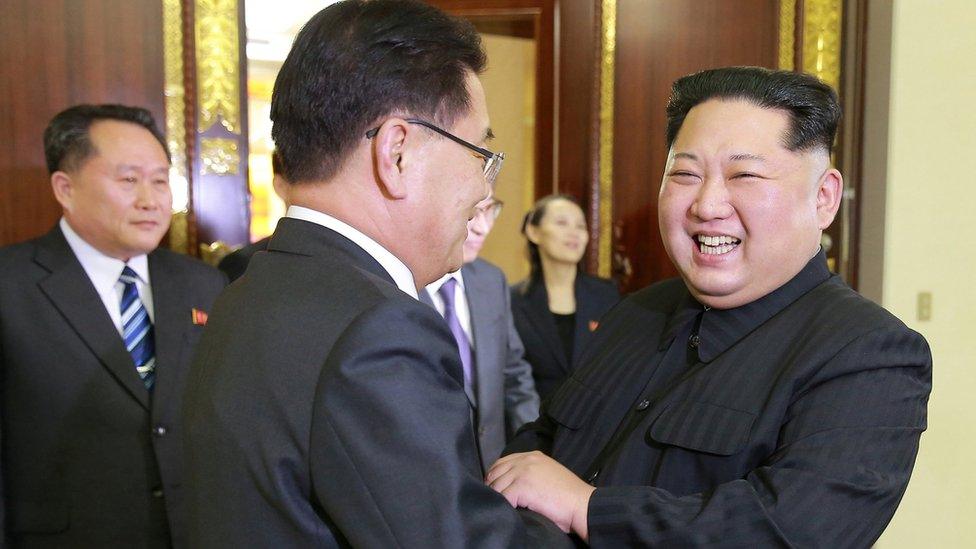
Kim Jong-un was pictured welcoming delegates from the South to a dinner on Monday
The North's KCNA news agency said Mr Kim had "warmly welcomed" the delegates and held an "openhearted talk" with them.
It said the dinner took place "in a warm atmosphere overflowing with compatriotic feelings".
However, some critics have suspicions over North Korea's intentions. In the past, they have failed to follow through on deals, notably an aid-for-disarmament agreement in 2005.
What happened at the Pyongyang dinner?
South Korean officials had a four-hour dinner with Kim Jong-un on Monday. Among the delegation were intelligence chief Suh Hoon and National Security Adviser Chung Eui-yong.
Pictures showed Mr Kim and visitors from the South smiling broadly around a dinner table.
Also present was Mr Kim's wife, Ri Sol-ju, who rarely appears at official events, and his sister Kim Yo-jong, who was part of a North Korean delegation to the Pyeongchang Olympics.
The two sides appear to be aiming to capitalise on the reduced tensions after the Games, which saw the Koreas march together under one flag.
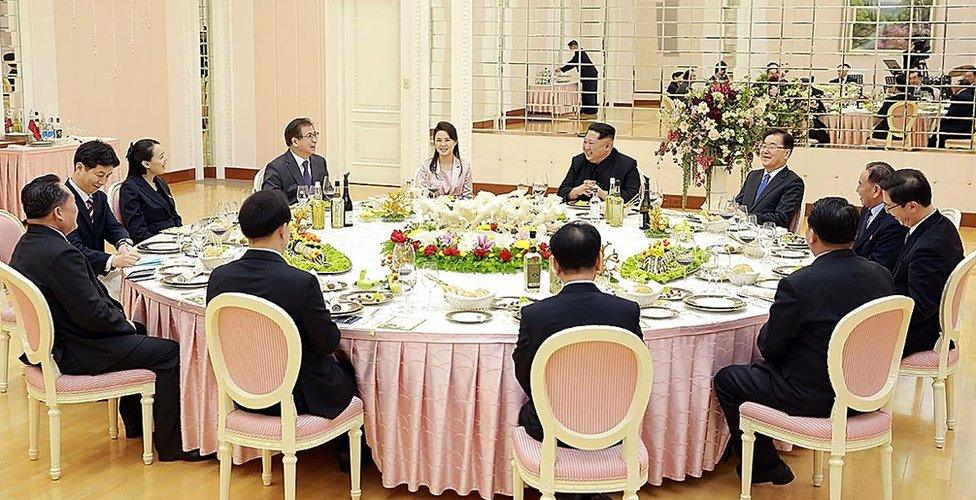
During their visit, the South's officials also held a boardroom meeting and passed on a letter from South Korean President Moon Jae-in, in which he invited Mr Kim to attend further talks.
KCNA said Mr Kim had "exchanged views and made a satisfactory agreement" on the letter and gave orders for it to be acted on.
Why is North Korea acting now?
It is difficult to be certain. Since the South made the announcement, there has been no comment from North Korea.
Some US and South Korean officials have said that Pyongyang may simply be trying to buy time to develop weapons programmes.
There have also been suggestions that Mr Kim is trying to soften the impact of biting sanctions on the impoverished country, seeking food and other aid from overseas.
Another factor may be growing diplomatic pressure from North Korea's neighbours, particularly from China - the regional superpower and Pyongyang's only real ally.
History of broken promises
A series of six-party talks have been held since North Korea decided to withdraw from the Nuclear Non-Proliferation Treaty (NPT) in 2003.
But attempts to negotiate aid-for-disarmament deals have repeatedly failed.
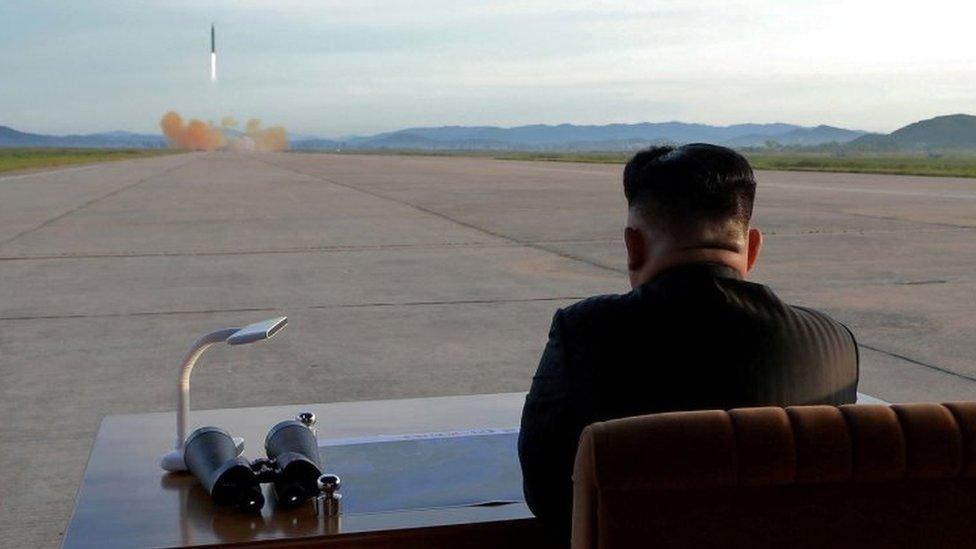
North Korean leader Kim Jong-un watches the launch of a Hwasong-12 missile
In 2009, North Korea pulled out of the talks and expelled all nuclear inspectors from the country, in response to UN Security Council criticism of a rocket launch. Pyongyang also vowed to resume its nuclear activities.
A number of bids to restart the talks collapsed, including in 2012 when North Korea launched another rocket, two weeks after announcing a "leap day" agreement with the US.
The North said it was commemorating the birth of its founding father, with a new satellite, but it was condemned by others as a provocative test of missile technology.
Throughout 2017 Mr Kim ordered a series of incendiary ballistic missile tests, significantly raising the stakes.
In response the UN implemented increasingly tough sanctions.
- Published28 February 2018
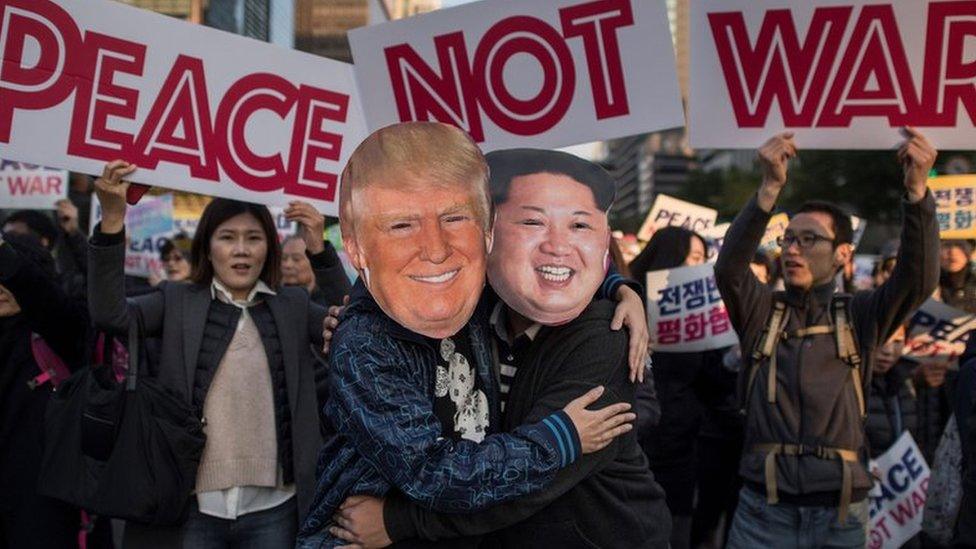
- Published20 February 2018
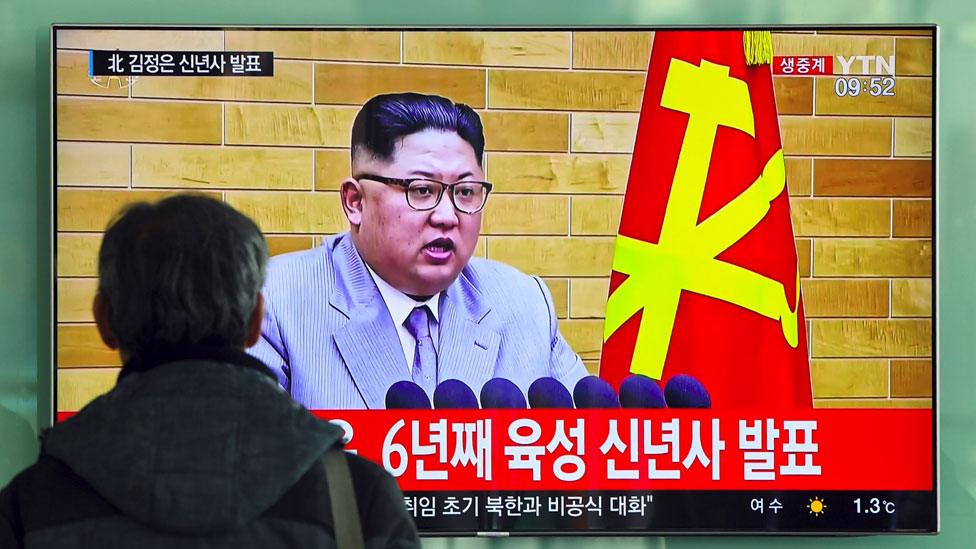
- Published25 February 2018
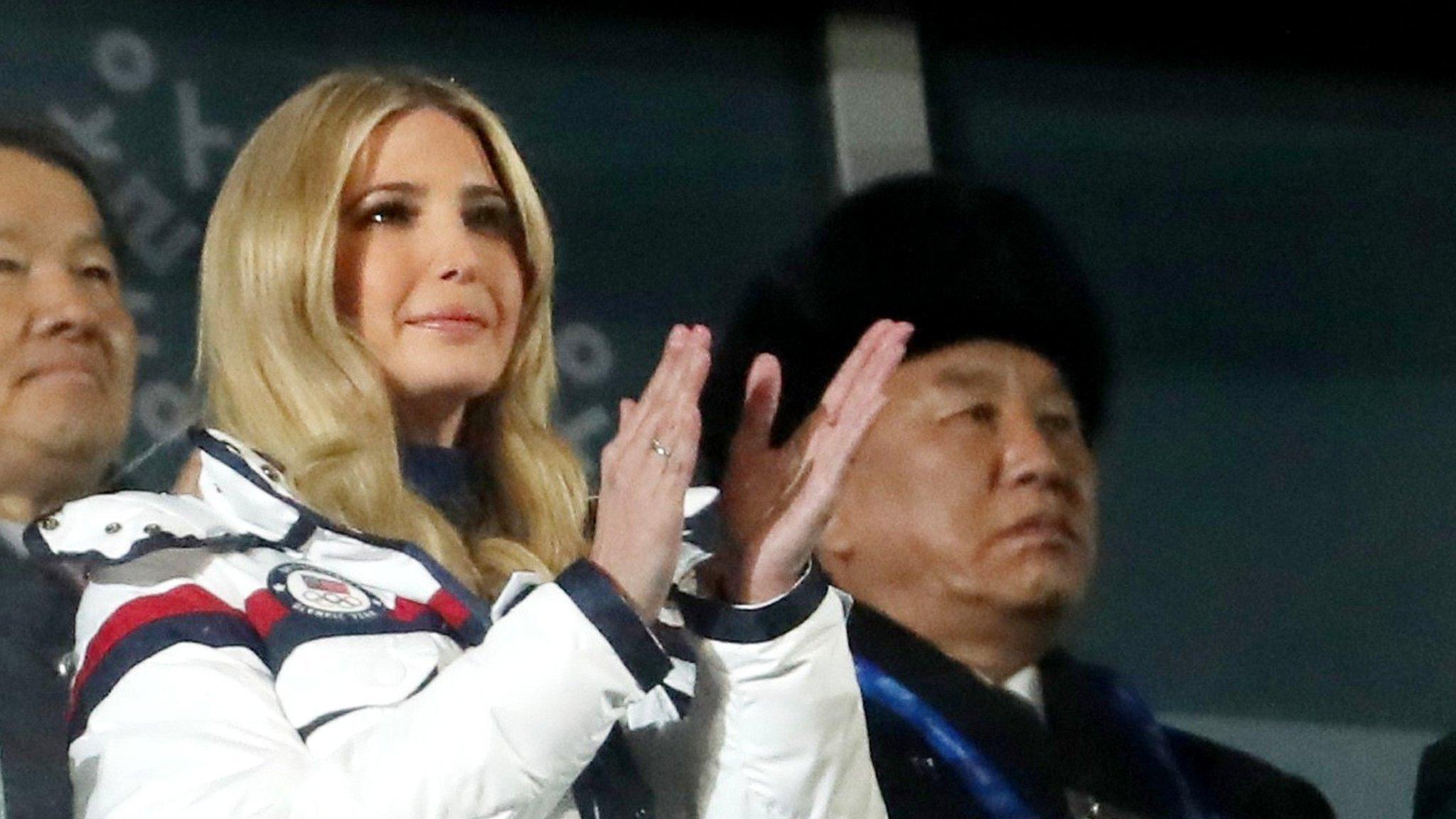
- Published7 February 2018
